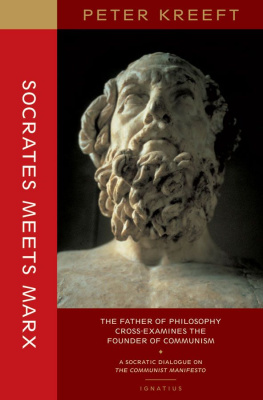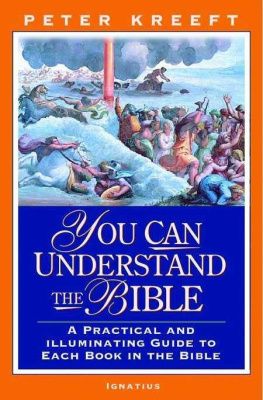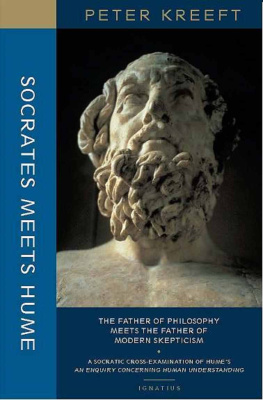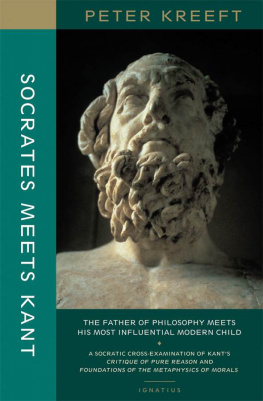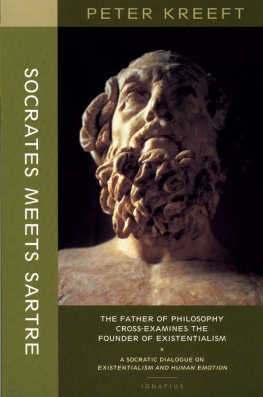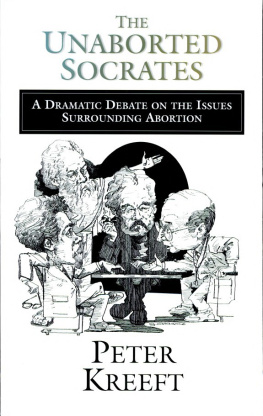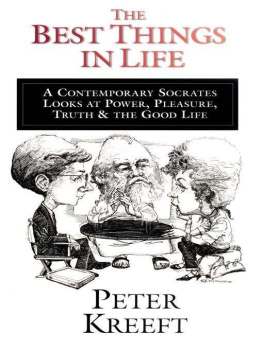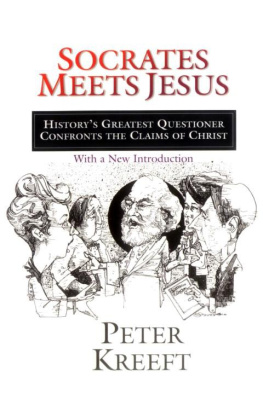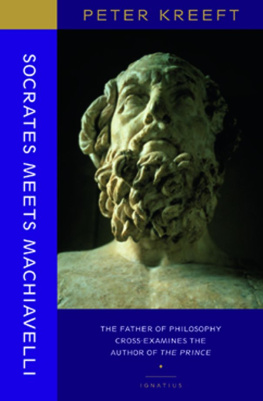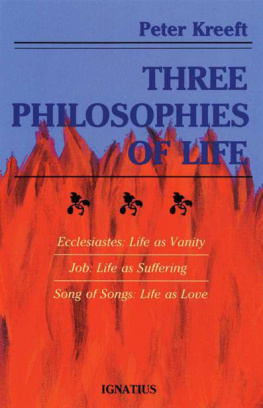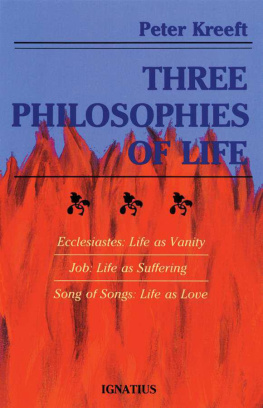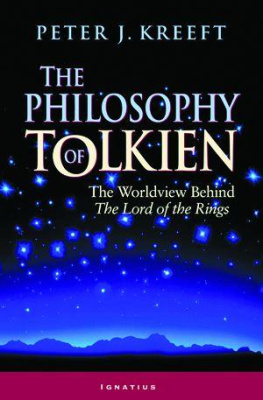Socrates Meets Marx
Socrates Meets Marx
__________
The Father of Philosophy
Cross-Examines the
Founder of Communism
A Socratic Dialogue
on The Communist Manifesto
by Peter Kreeft
IGNATIUS PRESS SAN FRANCISCO
Cover art: Stone Head of Socrates (469-399 B.C.)
(classic sculpture)
The Louvre, Paris, France/Bridgeman Art Library
Cover design by Roxanne Mei Lum
2004 by Ignatius Press, San Francisco
All rights reserved
ISBN 1-58617-017-1
Library of Congress Control Number 2004I07664
Printed in the United States of America
Contents
Introduction
This book is one in a series of Socratic explorations of some of the Great Books. Books in this series are intended to be short, clear, and non-technical, thus fully understandable by beginners. They also introduce (or review) the basic questions in the fundamental divisions of philosophy (see the chapter titles): metaphysics, epistemology, anthropology, ethics, logic, and method. They are designed both for classroom use and for educational do-it-yourselfers.
The Socrates Meets... books can be read and understood completely on their own, but each is best appreciated after reading the little classic it engages in dialogue.
The settingSocrates and the author of the Great Book meeting in the afterlifeneed not deter readers who do not believe there is an afterlife. For although the two characters and their philosophies are historically real, their conversation, of course, is not and requires a willing suspension of disbelief. There is no reason the skeptic cannot extend this literary belief also to the setting.
The I
MARX: I... I thought I was dying! And now I...
SOCRATES: That is a profound little word, Karl. Do you know what it means?
MARX: I dont know what youre talking about. I know one thing, though: Im not dead. I can hear you, and I can see you, too. In fact, you are the ugliest-looking doctor I have ever seen.
SOCRATES: I am not a doctor; I am a philosopher.
MARX: You look like Socrates.
SOCRATES: In this case appearance and reality coincide. I am Socrates.
MARX: But why you ? We have nothing in common, you and I.
SOCRATES: Oh, I think we do. I think we have at least two things in common: we are probably the two ugliest philosophers in history and the most hatedor loved.
MARX: Where in the world are we?
SOCRATES: Nowhere in the world. We are in the next world.
MARX: Nonsense! There is no next world.
SOCRATES: Ah... excuse me, but what do you think this is?
MARX: A dream, of course. It must be a dream. It certainly cant be real.
SOCRATES: Then who do you think is dreaming the dream?
MARX: My brain matter.
SOCRATES: My brain matter, you say? Who is this self that possesses brain matter?
MARX: It is I, Karl Marx, you idiot!
SOCRATES: But what is the meaning of that word you just used, that little word that we all use so easily, the word I?
MARX: Its certainly not the soul, as you thought it was, Socrates, or whoever you are.
SOCRATES: Tell me more. If you could teach me where I was wrong, I would be eternally grateful to you.
MARX: Your so-called soul is a ghost, a myth, an illusion. There are no souls. To be is to be material. It is you, Socrates, who almost single-handedly polluted the waters of philosophy with that muddy myth of the soul, that distraction from everything real, that ghost that you said was haunting the machine of our bodies. I will allow no spooks in my philosophy. I exorcise your ghost. Out, out, damned spirit!
SOCRATES: Alas, it seems that we cannot have the conversation we are destined to have until you are first convinced of an exceedingly elementary point: that you exist, that there is a self somewhere holding all those body parts together.
MARX: And how do you propose to argue for the existence of this self?
SOCRATES: Well, perhaps a modern argument would work for you better than an ancient one. What do you say about Descartes famous argument, I think, therefore I am?
MARX: I say it is a ridiculous argument.
SOCRATES: Why?
MARX: Only an idealist like him, or you, would resort to thought to ground real existence. It is the other way round: real existence grounds thought.
SOCRATES: Oh, I quite agree, if by ground you mean cause. Only a thing that exists can think. And thinking does not cause existence.
MARX: You confuse me by agreeing with me.
SOCRATES: Then I will unconfuse you by disagreeing with you. I think our disagreement is not about what causes what, but about what proves what. I suspect you do not agree that abstract, rational thought (like Descartes argument) can prove anything real.
MARX: You are right there. I accept only empirical, scientific evidence as proof for anything real.
SOCRATES: And do you have empirical, scientific proof for that principle?
MARX: I will not be distracted by your abstract logic. Thats why I am suspicious of most of the arguments of you philosophers. Descartes I think, therefore I am is wholly abstract. Nothing concrete proves it or refutes it.
SOCRATES: So you say that the thinking self that Descartes claims to prove is not a reality?
MARX: Exactly.
SOCRATES: What is it, then?
MARX: A dream.
SOCRATES: If the self is a dream, who is the dreamer?
MARX: Brain matter, of course. I prefer I pass wind, therefore I am to I think, therefore I am.
SOCRATES: So smelling is better proof than thinking?
MARX: Indeed it is! Its empirical and, therefore, scientific.
SOCRATES: So you know that you are real, not by thinking, but by sensing?
MARX: Right.
SOCRATES: And is that also the way you know someone else is real, like me?
MARX: It is.
SOCRATES: So you know others in the same way you know yourself: by sensation.
MARX: Correct.
SOCRATES: Do you know my thoughts now? Even before I speak them?
MARX: No.
SOCRATES: Do you know your own thoughts now, before you speak them?
MARX: Of course.
SOCRATES: Why? If you know others in the same way you know yourself, why should there be this great difference?
MARX: What a simplistic question!
SOCRATES: Perhaps it is. But do you have a simplistic answer for me?
MARX: Yes! It is because the chunks of matter that constitute your brain and the chunks of matter that constitute my brain are different and separate in space and do not touch.
SOCRATES: But then why....
MARX: Wait! Why am I arguing abstract philosophy with you? What am I doing here? I was in bed waiting to die, and now I am arguing philosophy with Socrates in a dream. This is ridiculous.
SOCRATES: It is not. It is what you must do, what all must do, eventually. It is the first commandment: Know thyself. It is not an option but a requirement. And while you could easily divert yourself from that task in the other world, that is not permitted here. That is why I have been sent to teach you. In the other world you could easily avoid methat is, the task I represent, know thyself. In this world you do not have that option.
MARX: Well, I will play your game, then, simply because I seem to have no other option. Tell me, please, more about this so-called next world. Do you know the future here? The future of life on earth, I mean.
SOCRATES: Yes, some of it, as much as is needed.
MARX: How?
SOCRATES: You are not ready to learn that yet. That would be a diversion and a distraction.
MARX: A diversion from what? What must I do?
SOCRATES: You must remember....
MARX: I do not like to remember, I prefer to plan. I prefer the future to the past.
SOCRATES: In other words, you prefer dreams to facts.
MARX: No, no. I am a lover of facts. I am a scientist. In fact, I was the first to find the scientific formula for all of human history. And I found countless facts to prove my formula. You see, Socrates, that is how a scientist proves his ideas: with concrete facts, not with abstract arguments, like you philosophers.
Next page
